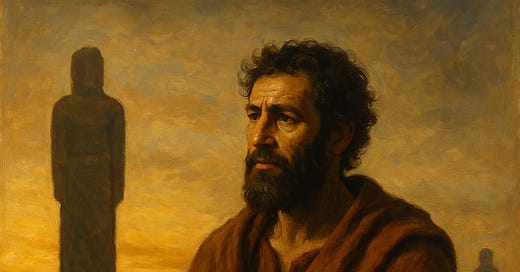A guest post. By a friend of the blog.
We all know the story.
Avraham Avinu. The odd one out. He lived in a world where idol worship was the air people breathed. It wasn’t just belief; it was life itself. A tightly woven system passed down with reverence, repeated with certainty. A mesorah you could no more question than you could question gravity. It simply was.
But Avraham looked around and said, Nah. This makes no sense. And not because he was some great philosopher. Not because he studied under renowned scholars or spent his nights pouring over ancient texts. No, he was just a guy who spent too much time in his father’s idol shop and smelled the bullshit.
Maybe he saw the cracks first in small ways. The way people prayed to statues that couldn’t hear them. The way those same people would turn around and chisel a new god when the old one broke. The absurdity of it all. One day, maybe he asked a question. And then another. And before he knew it, there was no turning back. He was a heretic.
And they made him a pariah for it. He was whispered about, pitied, chased out of town. I imagine his parents, late at night, murmuring about where they went wrong. Nebach, maybe they talked during sex, and that’s why he turned out this way. Maybe they gave him too much freedom. Maybe he was traumatized. Maybe, maybe, maybe.
But we don’t pity him now. No, now we tell his story with reverence. We call him Avraham Avinu, the father of three major world religions. The original iconoclast. The one who saw through the smoke and shattered the illusions.
And I can’t help but feel a connection - because I too grew up in a world where belief was the fabric of reality. It was the air we breathed, the rhythm of our days. A mesorah passed down with reverence, repeated with certainty. A truth so deep and all-encompassing, questioning it felt like trying to hold your breath forever. You could no more challenge it than you could defy gravity.
And then, one day, I looked around and said, Nah. This makes no sense.
Not because I know the truth - I don’t. I make no claims of certainty. But I know that whatever the truth is, it’s not what’s happening in Lakewood. It’s not the endless parsing of laws upon laws, the fearful bending of reality to fit a narrative that’s fraying at the seams. It’s not the way people convince themselves that the world is 6,000 years old while secretly Googling "how do fossils form?" in private browsers.
I don’t know what the truth is. But I know what it isn’t.
And for that, I am an outcast. No one has chased me out of town, but I am not fully inside it either. I walk its streets, but I don’t belong to them. I daven in its shuls, but I don’t pray. I say "Good Shabbos" with a smile, but the words are just an echo, a phrase I learned to say like an actor repeating his lines.
Like Avraham, I know what it is to see through something that others hold as sacred. To feel like I’m watching a play while everyone else thinks it’s real life. To know that speaking too honestly would mean isolation. To know that most people would rather believe I’m broken than believe I might be right.
But here’s the twist in the story that no one talks about.
Avraham didn’t leave. He didn’t set up camp in the wilderness and disappear. He stayed among the people. He argued with them. He fought for them. He raised a family in a world that didn’t understand him. He walked the fine line between challenging the system and existing within it. And maybe that’s what makes him truly great. Not just that he saw the illusions, but that he stayed and navigated them anyway.
And I know that I am not alone. I know that there are others like me, walking these streets, playing their parts, whispering their own Nahs in the quiet of their minds.
We stay for different reasons.
Maybe some of us stay because we love the people here. Because we have families we would never abandon. Because, in some strange way, this is still home, even if it no longer feels like ours.
Maybe Avraham wasn’t just the father of monotheism. Maybe he was the father of those of us who see through things but choose to stay anyway.
And maybe that’s enough.



This is such a good take ! Why has no one said this before
Thank you for writing this.
“Because, in some strange way, this is still home, even if it no longer feels like ours.”
This resonated with me in a very strong way.